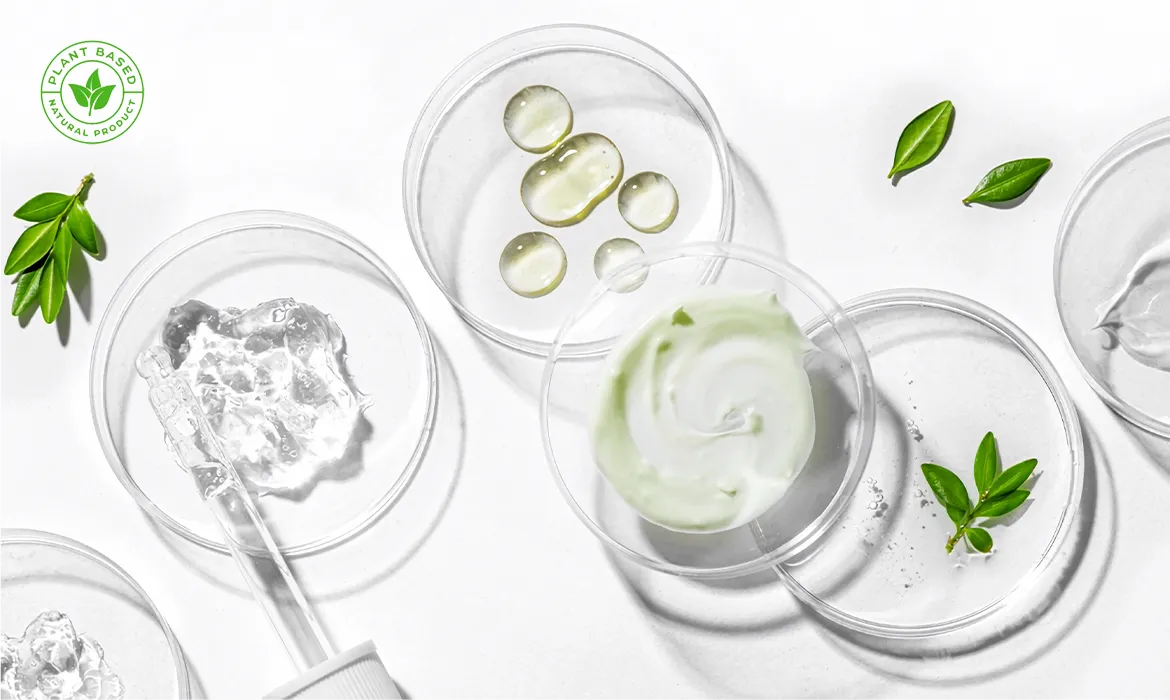At VIE – Être en Vie, we design sun protection not only as a cosmetic solution, but as a dermatological and molecular shield. Our 100% plant-based sunscreen is developed through advanced photobiology, skin barrier science, and phytochemistry, ensuring both efficacy and sustainability. Scientific Highlights: Broad-Spectrum Photoprotection (UVA/UVB/HEVL): Prevents cyclobutane pyrimidine dimers (CPDs) formation, oxidative DNA lesions, and collagen degradation. Phyto-Antioxidant Complex: Rich in polyphenols and flavonoids, proven to inhibit ROS-mediated lipid peroxidation and support mitochondrial function. Skin Barrier Preservation: Plant-derived lipids and polysaccharides reinforce the stratum corneum cohesion and optimize transepidermal water loss (TEWL) regulation. Microbiome-Compatible Formulation: Non-occlusive matrix maintaining a balanced skin microbiota, avoiding dysbiosis often induced by synthetic filters. Toxicological Safety: Free from endocrine-disrupting UV filters, ensuring long-term cutaneous tolerance and eco-compatibility with marine environments. This innovation represents more than natural photoprotection. It is a scientifically validated, next-generation sunscreen, where botanical actives undergo rigorous in vitro, ex vivo, and clinical evaluations to guarantee performance. At VIE, our vision is to set a new standard in plant-based photoprotection, merging molecular science with sustainable beauty.
Chemical UV filters may cause skin irritation, allergic, and photoallergic contact dermatitis. They are lipophilic molecules that may be absorbed and accumulated in the adipose tissue, leading to systemic effects (endocrine-disrupting effects, cytotoxicity, neurotoxicity, and behavioral changes). Some compounds are unstable under exposure to ultraviolet radiation and may trigger phototoxic reactions, adding extra oxidative damage to skin cells. To mitigate this effect, different antioxidants (retinol, ascorbic acid, and tocopherol) have been included in sunscreen formulations. Another disadvantage of conventional UV filters is the harmful effect on ecosystems, which negatively impacts the human body. The demand for natural, safe, and sustainable alternatives to synthetic UV filters has driven significant interest in plant-based compounds and extracts for sunscreen formulations. These natural ingredients provide protection against ultraviolet (UV) radiation while often offering additional skin benefits, such as antioxidant and anti-inflammatory properties. Some plant compounds contain chromophores that absorb UV radiation and convert it into harmless heat, similar to synthetic chemical filters. Plant compounds with aromatic rings usually show a broad absorption spectrum with a wavelength range of 200–400 nm. Antioxidants present in plant extracts neutralize reactive oxygen species (ROS), mitigating the oxidative stress induced by UV radiation. Moreover, plant-derived compounds often possess anti-inflammatory properties that soothe the skin and reduce erythema (sunburn). Notable natural compounds that can be used in sunscreen formulations are polyphenols (epigallocatechin gallate from green tea; proanthocyanidins from grape seed; flavonoids like apigenin, quercetin, rutin, kaempferol; phenolic acids, such as ferulic acid and caffeic acid), carotenoids (beta-carotene, lycopene, and lutein), seed oils (shea butter, cocoa butter, jojoba oil, rosehip oil, and grapeseed oil), volatile oils (chamomile, lavender), and alkaloids (sanguinarine, piperine, and caffeine).
Reference:
Lungu, C., Grădinaru, A.C. and Ivănescu, B. (2025) Plant-based sunscreens: Innovations and new formulations. IntechOpen, 25 February

80 min